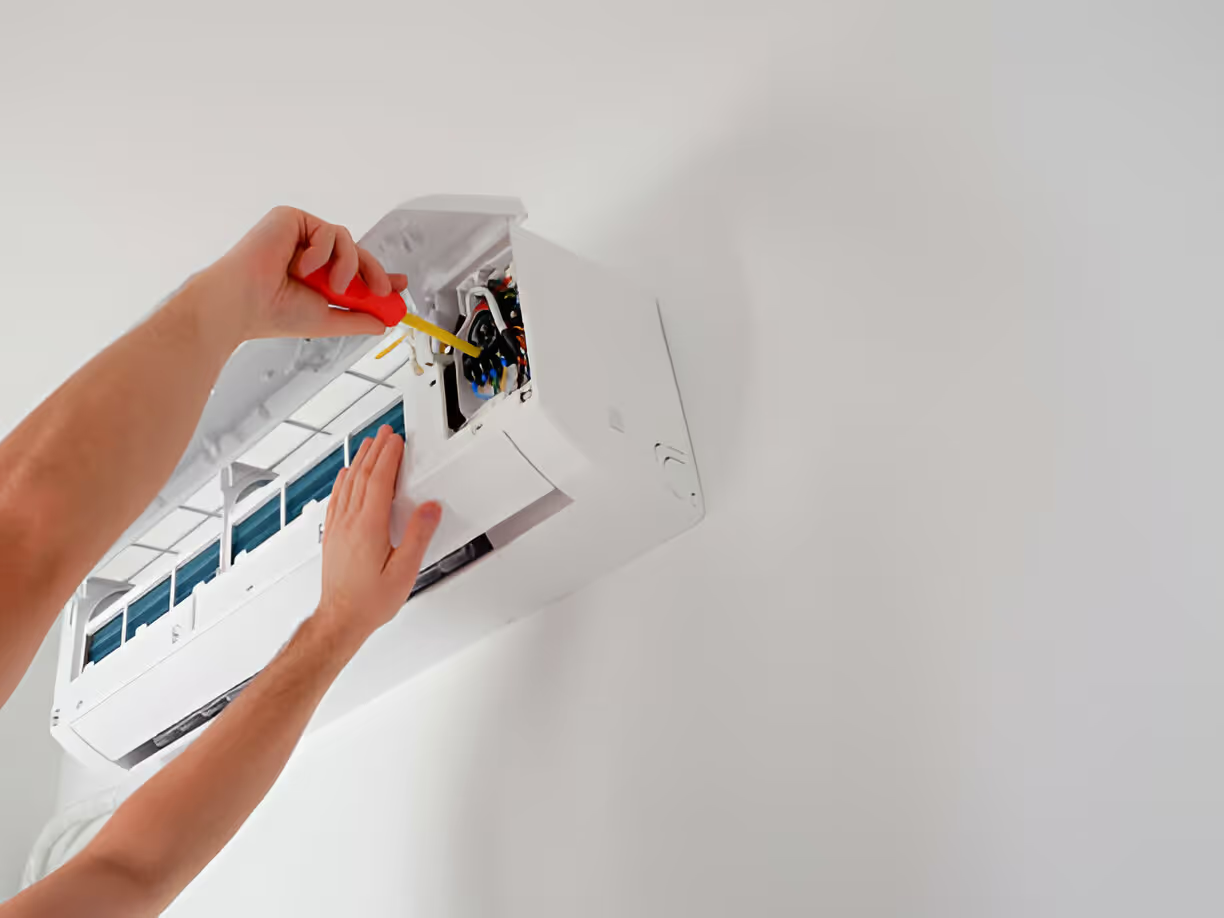Mini-Split Maintenance in Lithia, FL


Why mini-split maintenance matters in Lithia, FL
Lithia experiences high humidity, heavy summer usage, pollen and airborne debris from nearby trees, and occasional severe weather that can cause power surges. These factors increase the risk of coil fouling, drain line clogs, refrigerant leaks, electrical wear, and microbial growth inside indoor units. Regular maintenance reduces energy bills, prevents mid-summer breakdowns, and helps protect indoor air quality in your home.
Common mini-split issues in Lithia, FL
- Clogged filters leading to reduced airflow and frozen evaporator coils
- Dirty evaporator or condenser coils that lower efficiency and cooling capacity
- Clogged drain lines and pans causing water leaks, odor, or mold growth
- Refrigerant leaks or improper charge causing poor cooling and higher energy use
- Loose or corroded electrical connections, failing capacitors, or worn relays
- Excessive cycling or abnormal noises from indoor or outdoor units
- Reduced efficiency after storms or long periods of heavy use
What a professional maintenance visit includes
A thorough mini-split maintenance service covers inspection, cleaning, testing, and adjustment to restore reliable performance.
- Filter cleaning and replacement
- Inspect washable and disposable filters. Clean washable filters with warm water and mild detergent and fully dry before reinstalling. Replace disposable filters as needed based on condition and your indoor air quality. Frequency depends on pollen, pets, and usage.
- Evaporator and condenser coil cleaning
- Remove accumulated dust, pollen, and debris from indoor coils and outdoor condenser fins to improve heat transfer and efficiency. Use coil-safe cleaners and gentle rinsing to avoid damage.
- Drain line and condensate pan cleaning
- Clear the condensate drain line and flush with a safe cleaning solution to prevent clogs and bacterial growth. Inspect secondary pans and condensate pumps where present to prevent leaks and odors.
- Refrigerant system checks
- Measure system pressures and temperatures to verify proper refrigerant charge. Inspect for visible leaks and test components if a low charge is suspected. Proper refrigerant levels are essential for efficient operation and compressor longevity.
- Electrical inspection and safety checks
- Check wiring, terminal tightness, contactors, capacitors, and fuses. Look for signs of corrosion or overheating. Verify safe operation of controls and high/low pressure safety switches.
- Performance and comfort testing
- Measure airflow, temperature split (indoor vs outdoor), and overall cooling capacity. Verify thermostat calibration and correct cycling. Listen for unusual noises and note vibration that may indicate loose mounts or failing components.
- System optimization
- Adjust refrigerant charge if needed, ensure outdoor unit is level and clear of obstructions, and confirm airflow pathways are unobstructed. Recommend minor repairs or replacements to prevent near-term failures.
Diagnostic approach technicians use
Technicians follow a methodical process to identify problems quickly and accurately:
- Interview homeowners about symptoms and usage patterns.
- Visually inspect indoor and outdoor units for debris, corrosion, and obvious damage.
- Perform electrical and refrigerant measurements using industry-standard tools.
- Test system under load to observe real-world performance.
- Provide a prioritized list of findings and explain how each item affects comfort, efficiency, and long-term costs.
This approach focuses on resolving root causes, not just temporary fixes.
Recommended maintenance schedule for Lithia homes
- Standard recommendation: Professional inspection and tune-up at least once per year.
- For Lithia conditions and heavy year-round use: Twice per year is advised — once before the peak cooling season (spring) and once after the peak humidity/storm season (late summer or early fall).
- High-risk situations: Households with pets, smokers, high pollen exposure, or irregular use should consider quarterly filter checks and more frequent professional cleanings.
Options for maintenance agreements
Homeowners typically choose from tiered maintenance plans that match budget and needs:
- Basic inspection plan: Annual visit covering filters, coil check, drain line flush, and basic safety checks.
- Standard maintenance plan: Biannual visits with full cleaning, refrigerant check, electrical inspection, and performance testing.
- Comprehensive care plan: Quarterly or biannual service with priority scheduling, detailed diagnostics, parts discounts, and seasonal adjustments for peak conditions.
Each plan helps prevent expensive emergency repairs, smooths out long-term operating costs, and preserves manufacturer warranties when required.
Benefits of regular mini-split upkeep
- Improved energy efficiency and lower utility bills
- Fewer unexpected breakdowns during hottest months
- Extended compressor and component lifespan
- Better indoor air quality and reduced mold or odor problems
- Safer operation with reduced electrical risks
- Predictable maintenance budget through planned visits
Practical maintenance tips for Lithia homeowners
- Check and clean or replace accessible filters every 1 to 3 months, more often during high pollen season.
- Keep outdoor units free of leaves, grass clippings, and debris; maintain at least 2 feet of clearance.
- Inspect visible drain lines and pans for standing water or slime. If you see slow drainage or odor, schedule a professional service.
- Avoid setting thermostats extremely low; moderate set points reduce compressor stress and humidity issues.
- After a major storm, visually inspect outdoor units for bent fins, debris, or loose panels and have electrical connections checked if you suspect a surge.
Regular attention to these items, combined with professional mini-split maintenance in Lithia, FL, helps ensure your system performs efficiently and reliably when you need it most.
Service Areas


